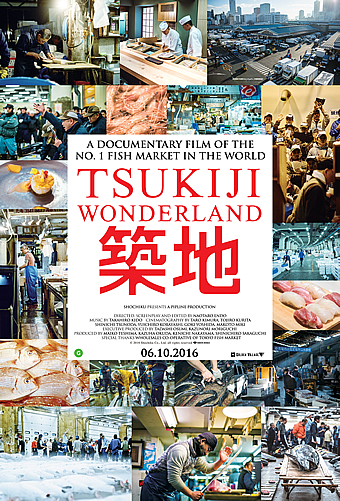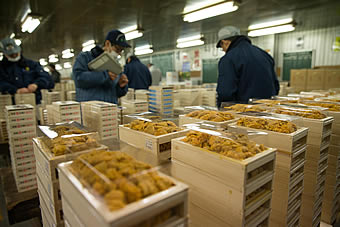TSUKIJI WONDERLAND (2016)
Genre: Documentary
Director: Naotaro Endo
Runtime: 1 hr 50 mins
Rating: G
Released By: Golden Village Pictures
Official Website:
Opening Day: 6 October 2016
Synopsis: Tsukiji Fish Market in Tokyo, renowned as ‘the world’s largest fish market’ is significant not only by its scale but more by the unique role it has played in Japanese food culture. All the best fish around the world, about 2,000 tons of fish worth sixteen million dollars arrive at Tsukiji every morning. There are about seven hundred intermediate whole sellers called “nakaoroshi” running their own fish shops under one roof. Nakaoroshi are fish experts with origins dating all the way back to the 16th century. Each nakaoroshi specializes in a certain category, such as tuna, shrimp or eel and their way of business, skills and knowledge in handling fish is passed down from generation to generation even to this day. Located right next to Ginza in central Tokyo, they have catered to the needs of demanding professionals and Tsukiji’s effort to offer the best quality fish for their customers never ceases. Through the lives of professionals working at Tsukiji, the film will portray how Tsukiji has been the center of fish culinary culture and helped Japanese food culture to flourish as we know it today. With Tsukiji moving from current location to Toyosu in 2016, its critical to capture this unique fish market in its current state. It is our great hope that this film helps tell the rich cultural story of Tsukiji so it can be carried on for the future.
Movie Review:
Tsukiji Wonderland is a documentary film which details the ins and outs of one of the busiest fish markets in the world – the Tsukiji Market. A first impression of a documentary film is that it could be boring, or has an endless regurgitation of facts after facts. However, Tsukiji Wonderland not only viewed its subject matter in a unique angle, it also engaged viewers from the beginning to the end.
The start of the movie gave a perspective of what Tsukiji Market meant to people, especially key people who invested much of their lives in Tsukiji Market. It could be quite offputting when it was said that the Tsukiji fish market is not only “the best one, it is the one and only”. It seems to convey a lot of elitism and snobbishness in that statement. However on retrospect, when the documentary is viewed in its entirety, one would really come to that same conclusion. Tsukiji Market, being the ‘one and only’, is in fact a symbol of pride and humility.
The movie had an excellent flow, first by engaging the audience with food – sushi. Even the most uninitiated person in the crowd would have come to associate Japan with sushi. The Japanese food culture was definitely introduced as a key part in the movie. The colour and vibrancy in them were also an eye feast. In doing so, it fascinates and establishes a bridge with the audience. This allows them to understand and take interest in what goes behind the food, and by extension the rest of the film.
One of the key highlights of the movie was its entire movement and balance. It talks about seasons, and about the ups and downs. The actions that go beyond the public’s eyes in the market, the rhythm in the making of food, the intricateness, passion and kodawari (roughly translates to the fastidiousness and pickiness in quality) of the pros – these were all were captured in their natural environment – genuine and undecorated.
To top off another reason to see through the lenses of Tsukiji Wonderland, is that it has rare footages from reels on the openings of the Tsukiji Market and also areas out of bounds to the general public. In particular, the movie took considerable amount of time to look closely into the lives of the heroes of Tsukiji Market – the intermediate wholesellers – who literally live and breathe the culture of the market. To explain the ‘kinship’ system they have within the market and with their customers, it was told elegantly through time and just by demonstrating how interconnected their lives are with one another.
The director demonstrated fluency in the subject matter. In this 16 months’ worth of filming, the market was explored from the inside out, with its impact extending beyond the market documented rightly as well. While the director developed the movie with foreign audience in mind, the topics explored in the movie was definitely relevant to its local audience as well. Borrowing words from the director Endo, “…people cannot objectively see their own culture so seeing it through the eyes of foreigners is an effective way to do it.” (a remark he gave for consulting Theodore Bestor, a professor of anthropology and director of the Reischauer Institute of Japanese Studies at Harvard University, who also wrote “Tsukiji: The Fish Market at the Center of the World.”).
Tsukiji Market is definitely only a tip of an iceberg with regards to Japanese culture. Yet, it is a gateway to begin the understanding of the profoundness of the Japanese culture. Although one of the motivations behind this movie is to bid farewell to Tsukiji Market, the tone of the movie was fun and light-hearted, not sentimental and melancholic. It also concluded with great hopes and positivity in continuing its legacy.
Movie Rating:





(A beautiful and moving documentary of the Tsukiji Market, packed with passion and pride. Such a fitting tribute!)
Review by Tho Shu Ling

Movie Stills
.jpg)

.jpg)
.jpg)
.jpg)
.jpg)
